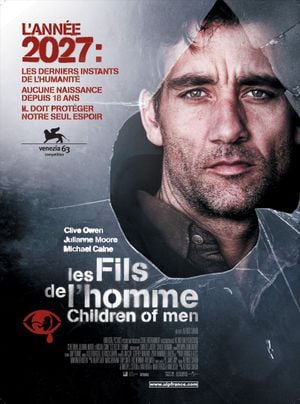The year is 2027.
It has been eighteen years since a child has taken birth on earth. We come to infer this from a newscast that begins the film, with various reports and the headline being the announcement of the death of Diego Ricardo, the youngest person in the world, killed for refusing to sign an autograph. The news is being shown inside a café in front of a room-filled crowd of people seemingly ranging from middle-aged to old, shocked and mournful at the tragic loss. We then get introduced to our protagonist, Theo, who comes for coffee, following him outside the café we then get introduced to the world of the film.
Since the tale is set in the future you would expect the world to have very futuristic technological flairs, flying cars, advanced architecture, etc. But what we see instead is a world in decay, streets dirty and drabby, surroundings holding on to a last thread before falling apart. A world slowly rotting.
The cause for the lack of children is said to be infertility, the cause for the infertility? We aren't told. And soon we realize why. Because that isn't really the focus. The infertility is just one of the characteristics of this world, a backdrop. How it happened isn't important, what it has ensued is.
War, terrorism, natural disasters, poverty and so on have plagued the world past the point of rehabilitation and also the hope for it. And what dims it even further is the absence of children.
Children of Men is one of those films where the world in the background is very much the driver for the story presented to us in the front, while at the same time the conflict at front is integral to the fate of everything else. This amazing synchronization of the front and back is the reason this film is such an absolute masterpiece in visual storytelling (in the same vein as Metropolis, Akira and Blade Runner, even though this movie is pretty much anti-Blade Runner). Another amalgamation of departments that work exceedingly well here are cinematography and set design. As mentioned earlier, the world of the film doesn't look particularly futuristic, places look like you've already seen, many spaces feel lived in and many abandoned. It's a reflection of our reality. A heightened reality, not exaggerated, but heightened. It's just distorted enough to seem fiction. Yes, "seem".
The sets are so painstakingly carefully and intelligently built that you have no choice but to submit and take it for a real place. It would be more of a pain to think about how it's constructed.
I saw some of the behind-the-scenes footage and in there was one scene from the movie shot on a lesser camera and taken out of the context of the film, it looks like some footage from a documentary that's been shot in secrecy. "Like documentary", which is how the director, Alfonso Cuarón, defined and intended the look of the film to be. The vast majority of film is shot handheld which would have been jarring otherwise if it wasn't handled so well. Prior to my knowledge of the director's intention, I wondered why it is shot that way, but by the end of the experience it became clear.
Oftentimes, in films, even great ones, the world seems to just exist in front of the camera or made to be so just for it. Which isn't a bad thing, but it can be very often detrimental if the film is aiming to be realistic. In the case of Children of Men, the camera exists in the world, the locations feel pre-existing, not presented. And this notion of pre-existence and its subsequent progression is a motif present throughout the film, in the dresses, the language, the events and the dialogue. The dialogue, contrary to Oppenheimer's, which is based on real events but feels too written, is believable. Dialogue doesn't need seem smartly quotable worthy written or be subtle to be great, it needs to be believable first and foremost. The dialogue here is rooted in the world, the pace and tone at which conversations happen at any moment make sense in that moment, that's good writing, and delivery.
But the aspect that's the most impressive about the film is its relevance.
The measure of any great piece of art is how much it holds up over time. And this film holds up hauntingly well. Hauntingly because the film isn't really about the seeking of some scientific discovery given its title and premise, it's the story of humans, their civilization and its ongoing collapse.
The rise of oppressive power and enforcement of will through fear and imprisonment.
And if you correlate that to our world, things do not look very bright. The suffering you see here is someone's reality right now. The time is different, the place is different, the reasons are different but the horror's all the same.
Broadly, the infertility and absence of children in the film could be roughly termed as MacGuffins but I think they serve a higher meaning. To be infertile, would be to be unable to produce, the inability to progress towards stability, the decline of humanity. And what hope is there for humanity if there are no humans? Children represent this hope, and the lack thereof represents its loss.
Even films that manage to hold up over time often have their relevancy reduced a bit, it's natural but rarely ever is the case that a film not only manages to be relevant for nearly twenty years, but also has it increase significantly with each passing year. It's scary that we are only three years away from when the film takes place.

